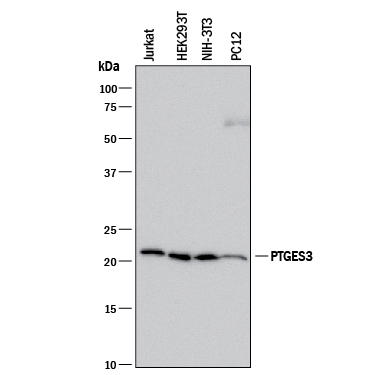Human/Mouse/Rat p23/PTGES3 Antibody Summary
Gln21-Glu160
Accession # Q15185
Applications
Please Note: Optimal dilutions should be determined by each laboratory for each application. General Protocols are available in the Technical Information section on our website.
Scientific Data
 View Larger
View Larger
Detection of Human, Mouse, and Rat p23/PTGES3 by Western Blot. Western blot shows lysates of Jurkat human acute T cell leukemia cell line, HEK293T human embryonic kidney cell line, NIH-3T3 mouse embryonic fibroblast cell line, and PC-12 rat adrenal pheochromocytoma cell line. PVDF membrane was probed with 1 µg/mL of Mouse Anti-Human/Mouse/Rat p23/PTGES3 Monoclonal Antibody (Catalog # MAB10039) followed by HRP-conjugated Anti-Mouse IgG Secondary Antibody (Catalog # HAF018). A specific band was detected for p23/PTGES3 at approximately 23 kDa (as indicated). This experiment was conducted under reducing conditions and using Immunoblot Buffer Group 1.
Reconstitution Calculator
Preparation and Storage
- 12 months from date of receipt, -20 to -70 °C as supplied.
- 1 month, 2 to 8 °C under sterile conditions after reconstitution.
- 6 months, -20 to -70 °C under sterile conditions after reconstitution.
Background: p23/PTGES3
Prostaglandin E Synthase 3 (also known as Cytosolic prostaglandin E2 synthase, HSP90 co-chaperone, Progesterone receptor complex p23, Telomerase-binding protein p23, or p23) is a glutathione-dependent enzyme found in the cyclooxygenase-1-mediated PGE2 biosynthetic pathway. This protein is highly conserved in eukaryotes and in humans it is expressed in most tissues other than striated muscle. Through its prostaglandin synthase activity, p23 contributes to the production of prostaglandin E2 and has a role in maintenance of tissue homeostasis. In addition to its catalytic activity in the prostaglandin biosynthesis pathway, p23 serves as a co-chaperone to HSP90 (Heat Shock Protein 90) in various biological functions. The p23/HSP90 complex is required for efficient telomerase assembly in vitro and in vivo. It has also been demonstrated that p23 and HSP90 localize to genomic response elements in a hormone-dependent manner, and may promote disassembly of transcriptional regulatory complexes in response to changes in cellular signaling pathways. p23 protein is up-regulated in several cancers, notably breast cancer.
Product Datasheets
FAQs
No product specific FAQs exist for this product, however you may
View all Antibody FAQsReviews for Human/Mouse/Rat p23/PTGES3 Antibody
There are currently no reviews for this product. Be the first to review Human/Mouse/Rat p23/PTGES3 Antibody and earn rewards!
Have you used Human/Mouse/Rat p23/PTGES3 Antibody?
Submit a review and receive an Amazon gift card.
$25/€18/£15/$25CAN/¥75 Yuan/¥2500 Yen for a review with an image
$10/€7/£6/$10 CAD/¥70 Yuan/¥1110 Yen for a review without an image

